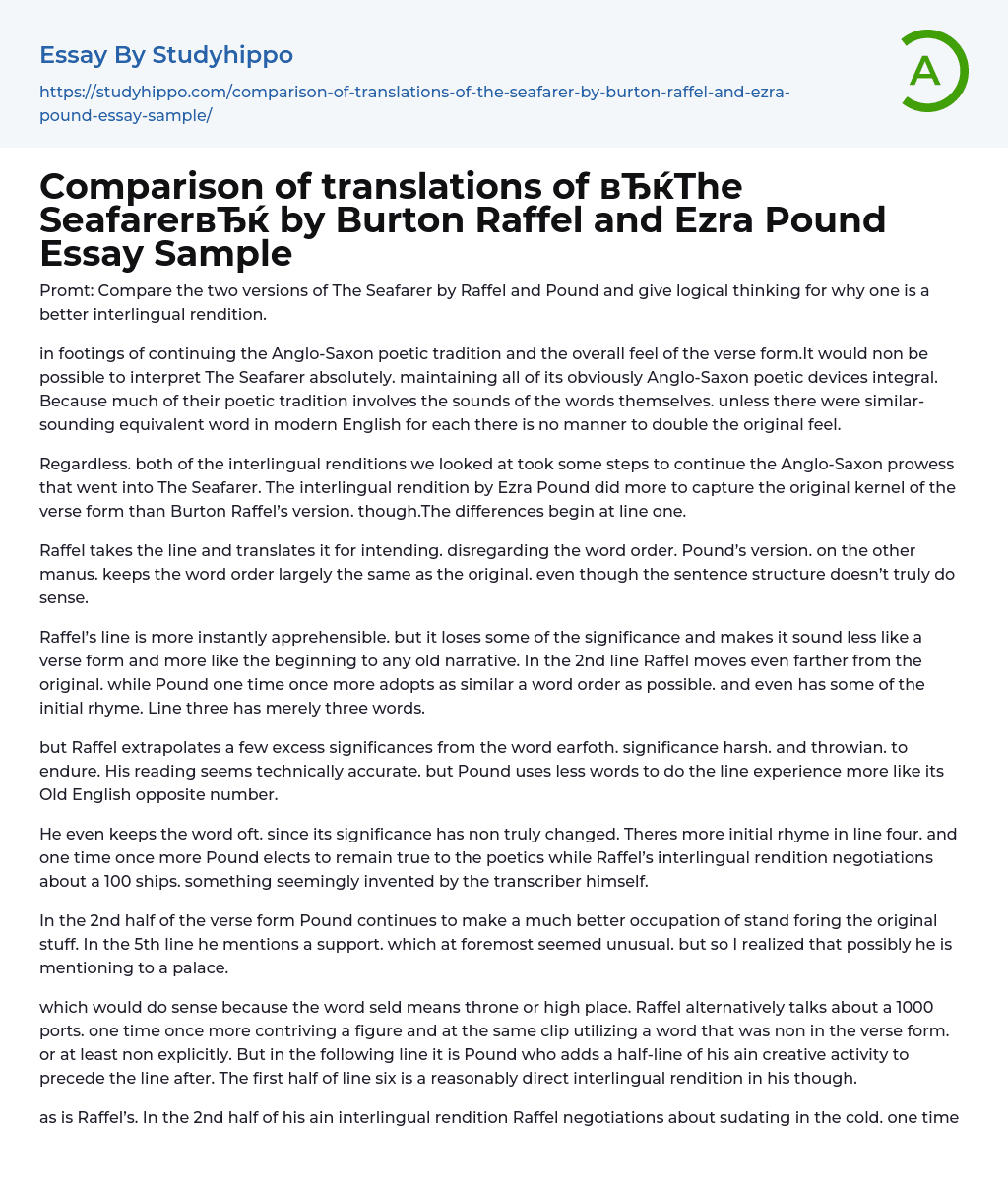

Comparison of translations of “The Seafarer” by Burton Raffel and Ezra Pound Essay Sample
Promt: Compare the two versions of The Seafarer by Raffel and Pound and give logical thinking for why one is a better interlingual rendition.
in footings of continuing the Anglo-Saxon poetic tradition and the overall feel of the verse form.It would non be possible to interpret The Seafarer absolutely. maintaining all of its obviously Anglo-Saxon poetic devices integral. Because much of their poetic tradition involves the sounds of the words themselves. unless there were similar-sounding equivalent word in modern English for each there is no manner to double the original feel.
Regardless. both of the interlingual renditions we looked at took some steps to continue the Anglo-Saxon prowess that went into The Seafarer. The interlingual rendition by Ezra Pound did more to capture the original kernel of the verse form than Burton Raffel’s version. t
...hough.The differences begin at line one.
Raffel takes the line and translates it for intending. disregarding the word order. Pound’s version. on the other manus. keeps the word order largely the same as the original. even though the sentence structure doesn’t truly do sense.
Raffel’s line is more instantly apprehensible. but it loses some of the significance and makes it sound less like a verse form and more like the beginning to any old narrative. In the 2nd line Raffel moves even farther from the original. while Pound one time once more adopts as similar a word order as possible. and even has some of the initial rhyme. Line three has merely three words.
but Raffel extrapolates a few excess significances from the word earfoth. significance harsh. and throwian. to endure. His reading seems technically accurate. but Pound uses less word
to do the line experience more like its Old English opposite number.
He even keeps the word oft. since its significance has non truly changed. Theres more initial rhyme in line four. and one time once more Pound elects to remain true to the poetics while Raffel’s interlingual rendition negotiations about a 100 ships. something seemingly invented by the transcriber himself.
In the 2nd half of the verse form Pound continues to make a much better occupation of stand foring the original stuff. In the 5th line he mentions a support. which at foremost seemed unusual. but so I realized that possibly he is mentioning to a palace.
which would do sense because the word seld means throne or high place. Raffel alternatively talks about a 1000 ports. one time once more contriving a figure and at the same clip utilizing a word that was non in the verse form. or at least non explicitly. But in the following line it is Pound who adds a half-line of his ain creative activity to precede the line after. The first half of line six is a reasonably direct interlingual rendition in his though.
as is Raffel’s. In the 2nd half of his ain interlingual rendition Raffel negotiations about sudating in the cold. one time once more apparently non related to the original but sensible in footings of overall significance.Pound uses more initial rhyme in line seven. reasonably closely miming the sound of the Anglo-Saxon version every bit good as the significance. Raffel is uncharacteristically accurate here every bit good.
but he does non seek to double the initial rhyme. Pound and Raffel both treat the last line
likewise. but Pound took it to intend the ship came near to bust uping. whereas Raffel interpreted it as the ship being smashed. Raffel seems to really hold the original text in his favour here for one time.
although Pound’s still retains more of the original diction. Pound did alter the he of the ship to a she to suit the English manner of mentioning to boats. I don’t like this alteration as it takes off from the reliable Anglo-Saxon feel. but it is truly pretty child.
From my analysis of the different interlingual renditions of The Seafarer. its pretty clear which one is more successful at copying the Anglo-Saxon poetic traditions and manner. Ezra Pound’s The Seafarer is still apprehensible despite the assorted word order. merely as the original verse form may hold been a spot confusing. but overall comprehendible.
to a talker of Old English. The version by Raffel seems less foreign and confusing. but it loses some of its complexness and overall poetic feel. Pound does a superior occupation of blending Anglo-Saxon tradition with modern English words.BibliographyTranslation of The Seafarer by Burton RaffelTranslation of The Seafarer by Ezra Pound
- Dialect essays
- English Language essays
- Second Language essays
- Semiotics essays
- Sign Language essays
- Spanish Language essays
- Allegory essays
- Alliteration essays
- Comedy essays
- Comic book essays
- Drama essays
- Dystopia essays
- Fairy Tale essays
- Fantasy essays
- Fiction essays
- Ghost essays
- Gothic Fiction essays
- Gothic Literature essays
- Irony essays
- Legend essays
- Memoir essays
- Novel essays
- Poetry essays
- Satire essays
- Science Fiction essays
- Short Story essays
- The western essays
- Tragedy essays
- Witchcraft essays
- American Literature essays
- Between The World and Me essays
- Book Report essays
- Book Review essays
- Book Summary essays
- Books essays
- Character essays
- Coming of Age essays
- Dante's Inferno essays
- Everyday Use essays
- Flowers for Algernon essays
- Genre essays
- Greek Mythology essays
- Incidents in The Life of a Slave Girl essays
- Letter essays
- Literary Criticism essays
- Literary devices essays
- Literature Review essays
- Metaphor essays
- Myth essays
- Play essays



